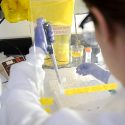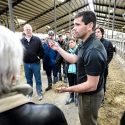UW-Madison announces six new ‘cluster hire’ initiatives
It’s no secret that the University of Wisconsin–Madison has faculty in a wide range of fields all across campus. But some of the best ideas are generated from conversations between people with different areas of expertise.
That’s part of the goal of the cluster hiring initiative, designed to foster collaborative research, education and outreach by creating new interdisciplinary areas of knowledge that cross the boundaries of existing academic departments. UW–Madison’s Cluster Hiring Initiative was launched in 1998 as an innovative partnership between the university, state and the Wisconsin Alumni Research Foundation (WARF). The university and WARF have just funded six new cluster hire initiatives.
“UW-Madison has long been a leader in taking this interdisciplinary approach,” says Provost Sarah Mangelsdorf. “This is an investment in our university’s future and strengthens our commitment to our research, education and outreach mission. This not only provides an opportunity for faculty members to work together across disciplines, it encourages us to think bigger in our approach to research, learning and problem solving.”
Forty-eight proposals were submitted for a first round of cluster hires, with six proposals chosen to be funded. Submissions for a second round of proposals will be announced, with a deadline of April 2, 2018.
“The proposals were chosen on the basis of their ability to catalyze new, pathbreaking areas of research, to engage researchers and students alike, and to provide the foundation for new areas of teaching and outreach,” says Michael Bernard-Donals, vice provost for faculty and staff. “In their focus on the interrelation of research and teaching, and the outcomes of the work for the public good, they are excellent examples of the Wisconsin Idea in action.”
The Cluster Hiring Initiative aims to provide an alternative to departmentally based hiring practices and norms. In essence, the initiative is an incentive plan designed to facilitate interdisciplinary strategic hiring by providing salary support for faculty positions. The historical objectives are to:
- Enable the campus to devote a critical mass of faculty to an area of scholarship that would not be addressed through existing departmental structures.
- Provide for new research tracks and collaborative opportunities.
- Address complex societal problems.
- Advance the Wisconsin Idea by serving society’s needs through interdisciplinary research, learning and service.
- Encourage and foster cooperation within an already strong faculty and staff.
- Create new curricular offerings on the undergraduate and graduate levels.
- Assist in fulfilling other missions of the university, particularly increasing campus diversity.
“These truly outstanding proposals have the potential to transform a number of fields of study, continuing the tradition of the University of Wisconsin–Madison as a leader in collaborative, interdisciplinary research,” says Marsha Mailick, who championed this initiative as the Vice Chancellor for Research and Graduate Education.
The six being funded are:
Reproductive Equity Cluster Alta Charo (Law School), Deborah Ehrenthal (Obstetrics & Gynecology), Pamela Herd (La Follette School of Public Affairs, Sociology), Jenny Higgins (Gender and Women’s Studies, Obstetrics & Gynecology) Laurel Rice (Obstetrics & Gynecology)
The purpose of the cluster is to build cross-disciplinary research expertise necessary to examine the drivers and consequences of inequities in reproductive health and to identify potential solutions. A goal is to add greater diversity to the voices engaged in these discussions, particularly with respect to health disparities and inequities, whether due to geography, socio-economic status, race or ethnicity.
Initiative in Social Genomics Jason Fletcher (Sociology/Public Affairs/Population Health Sciences), Corinne Engelman (Population Health Sciences), James Li (Psychology) andQiongshi Lu (Biostatistics and Medical Informatics)
Advances in genomics are transforming the world and allowing us to ask new questions and also approach old questions in new ways. The costs of sequencing the human genome have fallen an unprecedented 100 million times over the past 15 years, making the technology widely available to clinicians, researchers and the broader public. This proposal’s goal is to expand emerging expertise by integrating genetic and social and health science questions from multiple disciplinary backgrounds in health economics, genetic epidemiology, psychology and statistical genetics.
Functional Genetics/Genomics of Neurodevelopmental and Neurodegenerative Diseases Qiang Chang (Medical Genetics and Neurology), Anita Bhattacharyya, Cell & Regenerative Biology), Qiongshi Lu (Biostatistics & Medical Informatics), Luigi Puglielli (Medicine), John Svaren (Comparative Biosciences), Xinyu Zhao (Neuroscience)
The long-term goal for this cluster is to develop a pipeline of discovery that completes a cycle that begins with patients in the clinics and ends with new approaches for treatments or cures. This cycle of discovery begins with the identification of patient- specific genetic variants in the clinical setting, and then continues through experimental studies to confirm pathogenicity.
The Comparative Study of Modern Arab Politics and Society Nevine El Nossery (French and Italian), Nadav Shelef (Political Science), Mary Layoun (Comparative Literature and Folklore Studies)
This cluster focuses on the comparative study of the modern politics and societies of the Arab world. The cluster will not only complement existing strengths by addressing an area not well represented on campus, it will also establish a nexus for innovative and compelling research on the cutting edge of work on the region. Within the university, a focused cluster on the contemporary study of Arab politics and society will generate substantive collaborative scholarship between scholars in different departments. From outside our campus, this cluster will attract attention from other universities, major foundations and government agencies interested in developing a greater understanding of the policy challenges currently facing the country.
Human Cancer Genetics/Precision Medicine Paul F. Lambert (McArdle Laboratory for Cancer Research, SMPH), Margaret Raymond (Law School), Susannah Tahk (Law School), Robert Golden (School of Medicine and Public Health (SMPH), Richard Moss (SMPH), Steven M. Swanson (School of Pharmacy), Howard Bailey (Carbone Cancer Center), Stephen Meyn (Center For Human Genomics and Precision Medicine), Martha “Meg” E. Gaines (Center for Patient Partnerships), Arash Bashirullah (Pharmacy), Emery Bresnick (SMPH), Mark Burkard (SMPH), Susan Lederer (SMPH)
Cancer Genetics (includes epigenetic and omics research) has increased our basic understanding of how human cancers arise, and how to treat patients through precision (personalized) medicine. With the advent of these capabilities also come new uncharted territories, including how individuals respond to targeted drug therapies (pharmacogenomics) and the legal/ethical issues arising with genetically testing patients. The goals of this cluster are to enhance the UW–Madison campus’s studies on the genetics of human cancers, cancer pharmacogenomics, and the legal/ethical issues associated with genetic analyses of human patients.
Advanced Biomanufacturing William L. Murphy (Biomedical Engineering, Orthopedics & Rehabilitation), Sean Palecek (Chemical and Biological Engineering), Christian Capatini (Pediatrics, Carbone Cancer Center)
Advanced manufacturing of therapeutic medical devices, cells or tissues — termed “biomanufacturing” — is experiencing explosive growth as a scientific topic and as an industry in the United States. Thus, the state of Wisconsin — and the University of Wisconsin in particular — is clearly emerging as a national center of excellence in biomanufacturing. Current opportunities for scientific discovery and technological innovation in biomanufacturing create an ideal set of local ingredients for new, interdisciplinary faculty hiring at UW–Madison. The “Advanced Biomanufacturing”cluster emphasizes complex interdisciplinary approaches to manufacture functional human cells and tissues.
To learn more about the Cluster Hiring Initiative, visit facstaff.provost.wisc.edu/cluster-hiring-initiative.



